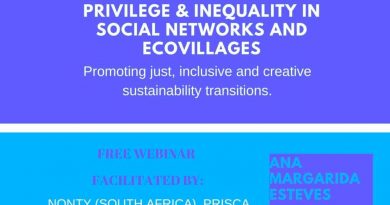Social Solidarity Economy & the Commons: bringing together different cultures
CEI researcher Ana Margarida Esteves was interviewed by the podcast Alternativ økonomi about the second edition of the International Conference Social Solidarity Economy and the Commons dedicated to the topic of “Contributions to the Deepening of Democracy,” which took place from 6 to 8 November 2019.
The researcher discusses the social value of certain kinds of for profit projects and initiatives, as well the principles underlying the concept of social solidarity economy initiatives, such as cooperative forms of ownership.
Listen to the interview on the Alternativ økonomi podcast website.
About the conference
The second international conference “Social Solidarity Economy and the Commons” was a meeting point for researchers, activists, public officials and social entrepreneurs involved in social and solidarity economy, governance of the commons and new social movements in different parts of the world.
The conference – dedicated to “Contributions to the Deepening of Democracy” – took place from 6 to 8 November 2019 at the Iscte – University Institute of Lisbon in Lisbon, Portugal. The aim was to co-create an open, interdisciplinary and transdisciplinary space for exchange of knowledge and socio-political experiences on new approaches to economic organisation and governance based in solidarity, cooperation and common ownership from across the world.
The conference was organized by the Centre for International Studies (CEI-Iscte), with the support of the Department of Political Economy at Iscte, the Centre for Ecology, Evolution and Environmental Changes (cE3c) in the Faculty of Sciences of the University of Lisbon, and the Solidarity Economy Incubator at the Federal University of Alagoas (UFAL) in Brazil.
Photo by Daan Stevens on Unsplash
![]() This work is licensed under a Creative Commons Attribution-NonCommercial-ShareAlike 4.0 International License.
This work is licensed under a Creative Commons Attribution-NonCommercial-ShareAlike 4.0 International License.




